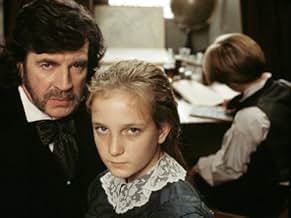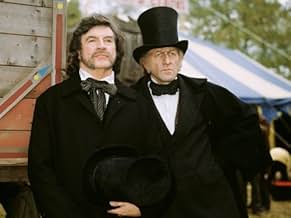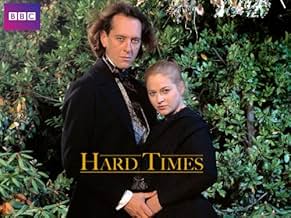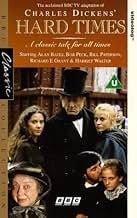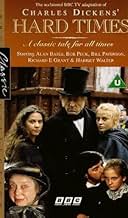Tom y Louisa se presentan por primera vez al público.Tom y Louisa se presentan por primera vez al público.Tom y Louisa se presentan por primera vez al público.
Explorar episodios
Opiniones destacadas
I was very disappointed when I purchased this DVD of "Hard Times" by Dickens. I cannot recommend it as a Dickens fan and as someone who is often blessed to see mostly Andrew Davies Adaptations of classic literature for the BBC. The music is creepy like a B movie horror flick, the acting is stiff, the lighting is horrible , and it is all too obvious that the scenes were mostly filmed in badly propped studio spaces. I was especially upset that I disliked the movie since it was filled with so many of my favorite actors such as Alan Bates and Richard E Grant. The actor who played Gradgrind gave the only acceptable performance in my eyes. The only consolation was that the short story TV classic "The Signalman" (adapted by Davies!) was added to fill the end of the Disk.
Bob Peck, Alan Bates, Richard E. Grant and Bill Paterson are all actors I admire a great deal. However their best work is elsewhere, and this video is in no way competitive with the 1977 Granada version which is finally out on DVD, and very much worth seeking out.
This 1994 version is truncated to the point of incoherence, sort of like reading Classics Illustrated comic books by flashes of lightning. None of the actors can survive the frenetic pace, with many scenes limited to just two lines of dialog. Characters can't be created in this kind of a rush, just sketched in, with Peck and Grant valiantly approximating real performances, Bates relying on tics and tricks, and Paterson actively bad. But I don't think it's really their fault.
The less-well known but far superior Granada version was adapted by Arthur Hopcraft and directed by John Irvin. Patrick Allen and Timothy West are iconic in their stovepipe hats as Gradgrind and Bounderby, Edward Fox gives a career-defining performance as Harthouse, and Alan Dobie is dry and restrained as Blackpool. Even Rosalie Crutchley as Mrs. Sparsit wins on points over the later version's scene-stealing Dilys Laye.
Skip this one and find the earlier Irvin-Granada version - you won't be disappointed.
This 1994 version is truncated to the point of incoherence, sort of like reading Classics Illustrated comic books by flashes of lightning. None of the actors can survive the frenetic pace, with many scenes limited to just two lines of dialog. Characters can't be created in this kind of a rush, just sketched in, with Peck and Grant valiantly approximating real performances, Bates relying on tics and tricks, and Paterson actively bad. But I don't think it's really their fault.
The less-well known but far superior Granada version was adapted by Arthur Hopcraft and directed by John Irvin. Patrick Allen and Timothy West are iconic in their stovepipe hats as Gradgrind and Bounderby, Edward Fox gives a career-defining performance as Harthouse, and Alan Dobie is dry and restrained as Blackpool. Even Rosalie Crutchley as Mrs. Sparsit wins on points over the later version's scene-stealing Dilys Laye.
Skip this one and find the earlier Irvin-Granada version - you won't be disappointed.
Brilliantly directed this film I found by accident and I have watched it three times since I have seen it, and it is a combination of theatre and cinema. The interiors of the wealthy are covered in red curtains and wallpaper, signifying I thought of how much blood there is on their hands. Set in the 19th C it is one of the least read of Charles Dicken's novels and that is a pity as it is very appropriate for our times. The poor have feelings while the rich have reasoned out thoughts especially on the use of money. No spoilers but a young man played well by Christien Anholt fluctuates between reason and the heart. The wealthy and the rulers reason that the heart is simply an organ of the body, and the blood red of their decors again shows how the blood that pumps it are on their walls. An industrial worker is fired from his work and becomes literally another person to survive. The images of him at the last part of the film are gut wrenching. But to return to the actual filming. Fixed scenes often follow fixed scenes as in a theatre and this focuses the mind and heart of the viewer in my opinion. I urge anyone who values the dignity of every person to track down this BBC masterpiece. I call it a film because of the way it is experimentally constructed and in no way is it comparable to the formula of a serial. Peter Barnes directed and he is one of the greatest of the UK playwrights; the like of which we rarely see now on our stages.
Richard E Grant really made this adaptation. It's a shame I have to write 5 lines on this because there's not a lot to say. Umm. Yes. Some of the glances between the characters were inspired expecially, between Harthouse and Louisa. REG played the dashing cad to a tee. Oh yes. One more line.................!
Made for British schools in 1994, this BBC version of HARD TIMES eschews the usual fancy costumes and elaborate sets of most BBC 'classics' and gets down to the story, focussing on the characters and their sometimes tragic lives and decisions. Don't let its origins put you off: this version boasts a cast most big budget films would kill for: Alan Bates, Richard E. Grant, Harriet Walter, Bill Paterson, and the late, great Bob Peck, magnificent as Gradgrind. Anyone tired of the respectful, white-glove treatment classic novels are usually given on TV will find this a refreshing change of pace: angry and passionate and bleak, with flashes of humour and humanity.
¿Sabías que…?
- TriviaLeft-handed Christien Anholt (Tom) is seen writing with his right hand, as Tom is right-handed.
- ConexionesVersion of Hard Times (1915)
Selecciones populares
Inicia sesión para calificar y agrega a la lista de videos para obtener recomendaciones personalizadas
- How many seasons does Hard Times have?Con tecnología de Alexa
Detalles
Contribuir a esta página
Sugiere una edición o agrega el contenido que falta



